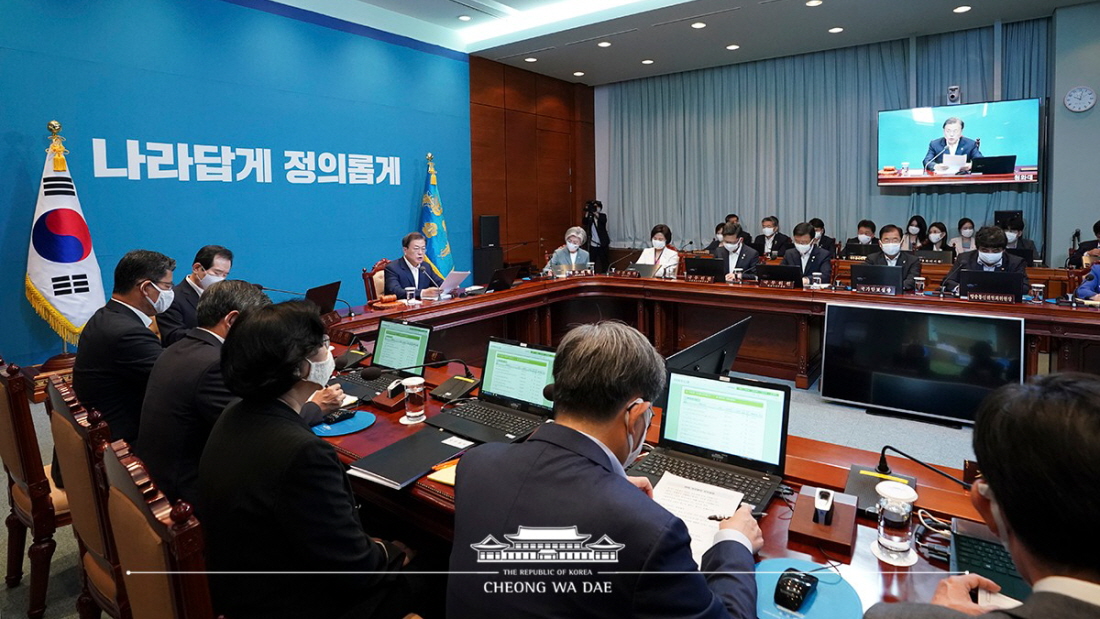이 웹사이트는 제19대 대통령 임기 종료에 따라 대통령기록관이 「대통령기록물 관리에 관한 법률」에 의해 이관받아 서비스하는 대통령기록물입니다. 자료의 열람만 가능하며 수정 · 추가 · 삭제는 불가능합니다.
다만, 「개인정보보호법」에 의하여 개인의 정보를 보호받기 원하시는 분은 관련 내용(요청자, 요청내용, 연락처, 글위치)을 대통령 웹기록물 담당자(044-211-2253)에게 요청해 주시면 신속히 검토하여 조치해 드리겠습니다. 감사합니다.
SPEECHES & REMARKS
BRIEFINGS

Let me begin the 30th Cabinet Meeting.
A crisis is particularly excruciating to the poor and less fortunate. The Government will do its utmost to alleviate the suffering of people who are having a hard time in the face of this economic crisis. We will further strengthen the employment and social safety nets, thereby taking this as an opportunity to firmly establish the framework for an inclusive nation.
In the process of overcoming crises, inequality has noticeably intensified almost as if a formula. We went through the foreign exchange crisis and the global financial crisis in the past. Even though we successfully surmounted both crises, history has shown that income disparities widen whenever a crisis comes along.
Even during the current crisis caused by the COVID-19 outbreak, we are seeing inequality becoming a real-life issue. The Government has been actively implementing inclusive policies. As a result, beginning last year, it succeeded reversing the trend toward polarization. Distribution indicators have improved accordingly.
However, inequality is worsening once again amidst the economic crisis prompted by the unexpected COVID-19 outbreak. Vulnerable workers such as temporary workers, day laborers, the contract-based self-employed and microbusiness owners are bearing the brunt of the employment shock. We are in a grave situation with COVID-19 aggravating the disparities.
The Government will set a clear policy goal of significantly reinforcing our social safety nets. We will continue to build a strong foundation for an inclusive nation and the value of putting the people first.
We will break the formula of a crisis stoking inequality. We will instead turn the crisis into an opportunity to narrow inequality. If we fail to achieve mutual benefits, we cannot be said to have genuinely overcome the crisis. The ultimate goal of the Korean version of the New Deal lies in this.
The social safety net should begin with establishing the employment safety net. I urge you to do all you can to develop our country’s employment safety net a further still. I ask you to take the current crisis as an opportunity to lay the foundation for an era of universal employment insurance. We can do so by expanding the benefits of the primary employment safety net, such as swiftly eliminating blind sports in employment insurance and gradually expanding the number of eligible employment insurance subscribers.
I also urge you to thoroughly prepare implementation of the employment support program, a Korean-style unemployment allowance system. As it is being introduced for the first time, I call upon you to make impeccable preparations, so it can take root successfully as the secondary employment safety net. In addition, I ask you to strive to further develop this program so that it can play a substantive role as an unemployment allowance system.
There shouldn’t be blind spots in the social safety net. The number of households in crisis – economically distressed due to unemployment – is on the rise. In line with easing requirements for emergency welfare support, we must identify households in crisis in a timely manner and swiftly provide the support needed. The Government has to meticulously examine the welfare delivery system along with local governments to ensure that there is no gap in support for households in need.
We must seamlessly implement the planned phase-out of rules on obligatory family support within the national basic living security system. I urge you to further enhance efforts to protect workers in vulnerable industries, for instance, by expanding the range of subscribers to the four major social insurance programs to include the contract-based self-employed.
Jobs are the best social safety net. The Government is also making all-out policy efforts to preserve jobs by assisting and protecting businesses in crisis, in addition to strong support measures to help maintain employment. In regard to this, the Government has embarked on creating emergency jobs on its own – providing opportunities to 550,000 vulnerable individuals. These not only provide steppingstones to those who lost jobs while getting back on their feet but also give young adults a chance to work and build experience. Ultimately, it will be a way to reduce welfare expenditures.
I ask you to take the Korean New Deal as an opportunity to create numerous jobs by expediting efforts to create mutually beneficial local jobs along with implementing policies to provide customized jobs especially for those in their 40s and in need.
Mutually beneficial cooperation is a shortcut to overcoming the crisis and part of the effort to establish a social safety net for each other. I ask you to institutionally support the spread of mutually beneficial cooperation by assisting such voluntary, mutually beneficial cooperation as the Good Landlord Campaign and the Good Franchise Campaign. I’d also like to see public institutions actively play roles in leading the culture of mutually beneficial cooperation, beginning with public procurement.
A grand social compromise is essential to overcome an arduous crisis. I have high expectations as labor, management and government have initiated social dialogues. We should find ways for all of us to survive by making small concessions to one another. I hope that the social dialogue efforts bear fruit as soon as possible, providing strength to surmount this crisis.



